I was brought up in a family where alcohol was considered the invention of the devil. My Mother had been brought up as a strict Methodist, where drinking was taboo and my Father's Father was an alcoholic, which gave him a very difficult childhood. In any case, alcohol was forbidden at our house, or anywhere on our property. I never thought about it when I was young, although I do remember a couple of young men who came to date my older sisters who were scared off by my Dad, when he smelled a trace of alcohol if they came too close.
I guess I was 18 or so before I ever tasted alcohol and then it was only a sip of punch, which I thought tasted terrible. However, in later years, I learned to have a drink now and then, sometimes quite a few drinks now and then. (I guess it's an acquired taste.)
Bootlegging was the subject of a few of our "Hashing Over History" sessions. These sessions often ran way over time, as one person or another remembered the strange things that happened during those long ago days. Several people who live in Clayton are descendants of those daring young men who made sure that there was whiskey* to be found, if you knew where to look. Of course, it was illegal and carried heavy fines if you were caught, but it also was very hard and dangerous work, and bootleggers were considered heroes by many people. Their lives were romanticized, and I believe more upstanding citizens were inclined to sympathize with the bootleggers, rather than the law.
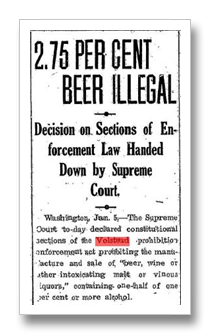
In the 1800s whiskey was plentiful and readily available all over the country. Stills were everywhere and whiskey was cheap. Too available and too cheap for many tired wives who carried the burden of trying to raise a family and do all the work while husbands often got the habit of spending their paychecks on whiskey and mistreating their families. Soon the women got together and tried to make the sale of whiskey illegal. Many battles were fought with the law and with the public, since of course, there was money to be made and whiskey was about the only form of recreation there was at that time.
In 1917 President Woodrow Wilson put a ban on the sale of whiskey, citing the need for grain to feed the troops and a starving public. He introduced a bill in 1918 and in 1919 the 18th amendment was enacted into law, banning the manufacture or sale of whiskey in the United States. This brought about the era of the "Speakeasies, the hidden stills, Moonshine Whiskey and Bathtub Gin." It was soon realized that there would be whiskey available for those who knew where to find it, but the government was losing the tax money which was involved in the sale of whiskey. Also the giant Mobsters were making a fortune and paying no tax on whiskey. It was rumored that Al Capone made 60 million dollars a year from the sale of untaxed whiskey. Also many jobs were lost, when legal whiskey was banned.
When Franklin Roosevelt was elected, he realized that something needed to be done. The country was in a major depression and many people were destitute. He introduced a bill that was enacted into law in February of 1933 which became the 21st amendment, legalizing the manufacture and sale of alcohol. The legal manufacture and sale of alcohol brought back more employment, tax money started pouring in and the good old days of bootlegging were over. However many stories and tales, some probably very exaggerated still remain to this day.
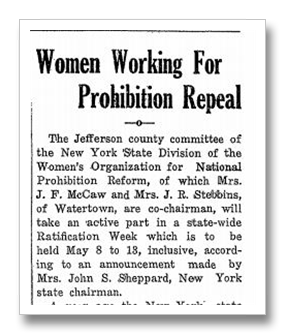
My husband Leo's family lived on a small farm on Grenadier Island near Cape Vincent, in the early thirties. Leo was born there. His Father, Frank told of one snowy winter day when a big Packard came across the ice from Kingston and was trying to cross the Island to make it to the American shore. They got stuck in a huge snow bank and came knocking late one night asking for help to get under headway again. Frank got the big team of work horse, and pulled them out of the drifts and helped them on their way. They were very grateful and presented him with a bottle of good whiskey to repay the favor. They told him it was their last run. They were nervous about the law catching them and were going to get out of the business.
They went on their way, but a little later there was a big explosion. It seems the law did catch up with them and apparently had shot the car, exploding the gas tank or the Whiskey or both. It truly was their last run!
Another story from our Family archives concerns Emerson Jobson. Emerson was my sister Ruth's second husband. I knew him as a very quiet, soft spoken gentleman, but it seems he had a “checkered past."
I don't know what brought the subject up, but it seems as a young man he wasn't against helping out a thirsty public, in Alex Bay. We all had a good chuckle when the story unfolded. It was a while ago and I don't remember all the particulars, but it seems that Emerson, a friend named "Booty" Joyner and another young man planned to bring in a load of Canadian whiskey one evening after dark. If I remember correctly, Emerson was waiting on the dock with a truck when the others arrived with the whiskey. Too late they realized that it was a trap and the law was waiting at the dock.
Just as the arrests were about to be made, Emerson (who was officially innocent since he hadn't touched the whiskey) pretended to be pushed off the dock, and made a big show of being in danger of drowning. The police, naturally had to try to save him while Booty and his friend made off with the whiskey. I'm not sure of the outcome, but I believe they all got away scot-free.
I'm no expert when it comes to finding information on the computer, but I try. While I was looking for information about these "good old days," I happened, by chance, on a goldmine of stories. They were too wonderful to ignore so I called and got permission from TAUNY, (Traditional Arts in Upstate New York) to use a few stories from "Tales of the River, Life on the St. Lawrence." This particular story was contributed by Leon Rusho Jr. entitled A BOY'S LIFE ON GRINDSTONE. What a story it is!
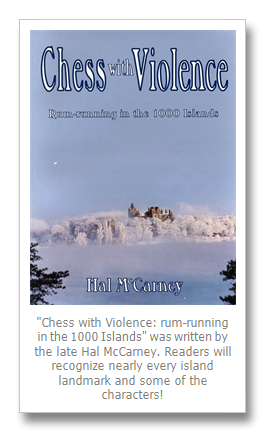
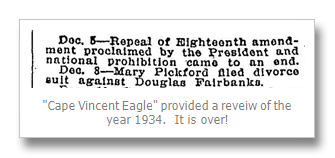
It seems when Leon was 9 and his friend was 10, his Grandfather had built a Sharpie, which was a "flat bottomed boat with a bow on it". They would row to Clayton, go around town collecting cardboard boxes wherever they could, take them to the Bathing Suit Factory and sell them for a nickel apiece. They would take the money, row all the way to Kingston, check to see which boathouse there was sporting a green shamrock sign. (That would be the one with the whiskey) They could buy the whiskey, for 25 cents a pint, row back to Clayton and sell it to Bill Bartlett and double their money. Can you imagine how much work that was for little boys? They called themselves the Junior Bootleggers.
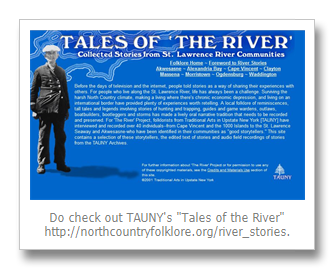
Another story in that article which I thought was hilarious; it seems, a long time Clayton resident, (I won't mention his name) had a new car. He would go around town and solicit money to "bring back a load". He would take the Ferry to Canada, go to Ivy Lea and buy bottles of whiskey. He would then go to a garage over there and have them take the tires off his car, stash the bottles in the tires, pack them in with hay put the tires back on and finish filling them with air. Then he would get on the Ferry and go to Alex Bay. He tried this once, but it didn't work out too well. The Customs officials were waiting in the Bay and just before the Ferry landed the bottles started popping in the tires. He tried to just walk off the Ferry, so they wouldn't know whose car it was. When someone told him they would know it was him by the registration, he just said they wouldn't, because "The car's registered in my wife's name!"
Tales from the past! There's probably no one left who can verify all these stories. Some are from my memories (which aren't too reliable) and others are tales from long ago. I've had a lot of enjoyment researching them. There’s a bountiful supply of stories on the internet. I'd tell you exactly how to find them if I could figure-out myself, how I did it in the first place.
By Nancy Bond
Nancy Bond began writing in high school 60+ years ago, but then family life took hold, as she and her husband Leo raised twelve children, on their farm in the town of Clayton. It was only recently that Nancy began writing her memories on paper, for her children to enjoy. The Thousand Islands Museum persuaded her to share these memories with the Thousand Islands Sun and now with TI Life for all to enjoy. Click here for Nancy’s other articles.
Note: This article was published in an October 2014 issue of the Thousand Islands Sun.
* Two spellings: Canada = Whisky; United States = Whiskey. Because the author is an American we went with the US spelling, however, the story is about smuggling Canadian Whisky... so we ask our readers to decide which is best. Personally we keep a bottle of Canadian Club on hand, making either spelling correct!